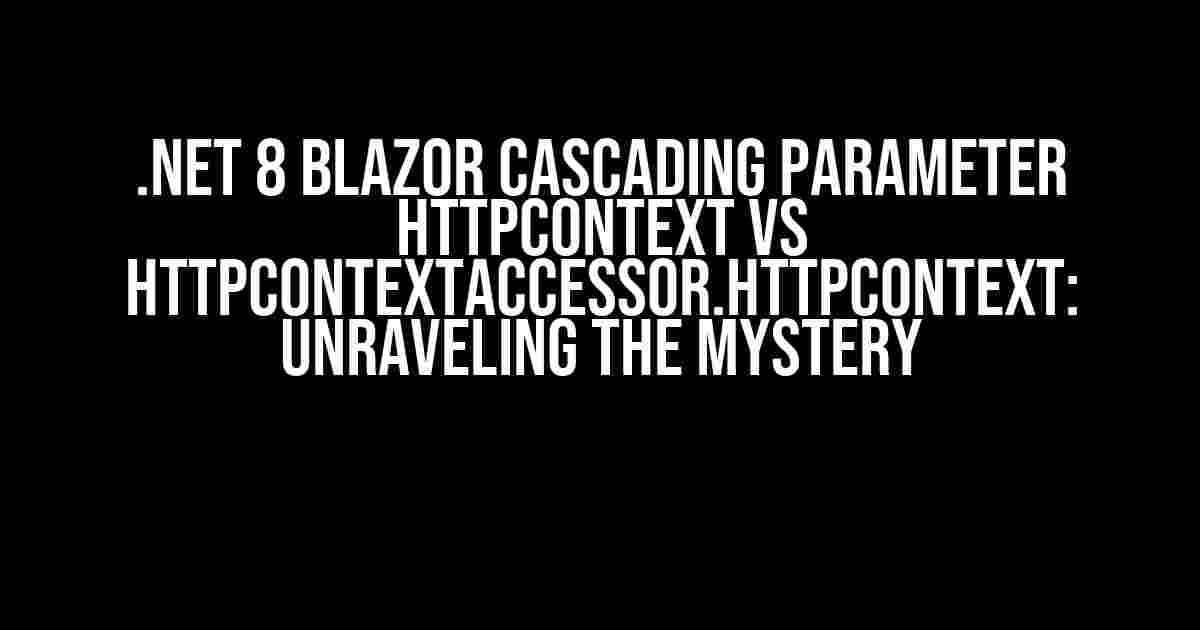If you’re a .NET developer, especially one who’s ventured into the world of Blazor, you’ve probably stumbled upon the terms “Cascading Parameter” and “HttpContext” at some point. But have you ever wondered what they really mean? More importantly, have you ever struggled to understand the difference between HttpContext and HttpContextAccessor.HttpContext? Fear not, dear reader, for today we’re going to delve into the fascinating realm of .NET 8 Blazor and shed light on these mysterious concepts.
What is a Cascading Parameter?
A Cascading Parameter is a special type of parameter in Blazor that allows you to pass values from a parent component to its child components. Yes, you read that right – it’s a way to “cascade” values down the component hierarchy. Think of it as a waterfall of data, flowing effortlessly from one component to the next.
<CascadingParameter Name="Title" />
<h1>@Title</h1>In the above example, we’re using the `CascadingParameter` attribute to specify a parameter named “Title”. This parameter can then be accessed by child components, allowing them to display the title in a nice, shiny `
` tag.
What is HttpContext?
HttpContext is an object in .NET that represents the current HTTP request and response. It’s like a messenger that carries information between the client and server, allowing you to access details like the user’s IP address, request headers, and even the HTTP method used (GET, POST, PUT, DELETE, etc.).
@using Microsoft.AspNetCore.Http
@inject IHttpContextAccessor HttpContextAccessor
<h2>Request Method: @HttpContextAccessor.HttpContext.Request.Method</h2>In the above example, we’re using the `IHttpContextAccessor` interface to access the `HttpContext` object, which in turn allows us to retrieve the request method (e.g., “GET”, “POST”, etc.).
What is HttpContextAccessor.HttpContext?
HttpContextAccessor is a service in .NET that provides access to the `HttpContext` object. Think of it as a bridge that connects your application code to the underlying HTTP request and response.
@using Microsoft.AspNetCore.Http
@inject IHttpContextAccessor HttpContextAccessor
<h2>Request IP Address: @HttpContextAccessor.HttpContext.Connection.RemoteIpAddress</h2>In the above example, we’re using the `HttpContextAccessor` to access the `HttpContext` object, which allows us to retrieve the remote IP address of the client making the request.
HttpContext vs HttpContextAccessor.HttpContext: What’s the Difference?
So, what’s the difference between `HttpContext` and `HttpContextAccessor.HttpContext`? The answer lies in how they’re accessed and used.
- HttpContext: This is the actual object that represents the current HTTP request and response. You can inject it directly into your components or services, but be warned – it’s only available in certain contexts, like Razor components or middleware.
- HttpContextAccessor.HttpContext: This is a property of the `HttpContextAccessor` service that provides access to the `HttpContext` object. You can inject the `HttpContextAccessor` service into your components or services, and then access the `HttpContext` object through its `HttpContext` property.
In other words, `HttpContext` is the actual object, while `HttpContextAccessor.HttpContext` is a way to access that object through a service.
When to Use Each?
So, when should you use `HttpContext` and when should you use `HttpContextAccessor.HttpContext`? Here are some guidelines:
- Use HttpContext when:
- You’re working in a Razor component or middleware.
- You need direct access to the `HttpContext` object.
- Use HttpContextAccessor.HttpContext when:
- You’re working in a service or a class library.
- You need to access the `HttpContext` object in a context that doesn’t provide it directly.
In general, if you’re working in a Razor component or middleware, you can inject `HttpContext` directly. However, if you’re working in a service or class library, you should use `HttpContextAccessor.HttpContext` to access the `HttpContext` object.
Real-World Scenarios
Let’s take a look at some real-world scenarios to illustrate the differences between `HttpContext` and `HttpContextAccessor.HttpContext`.
Scenario 1: Razor Component
@using Microsoft.AspNetCore.Http
@inject IHttpContext HttpContext
<h2>Request IP Address: @HttpContext.Connection.RemoteIpAddress</h2>In this scenario, we’re working in a Razor component, so we can inject `HttpContext` directly and access its properties.
Scenario 2: Service
@using Microsoft.AspNetCore.Http
@inject IHttpContextAccessor HttpContextAccessor
public class MyService
{
private readonly IHttpContextAccessor _httpContextAccessor;
public MyService(IHttpContextAccessor httpContextAccessor)
{
_httpContextAccessor = httpContextAccessor;
}
public void DoSomething()
{
var ipAddress = _httpContextAccessor.HttpContext.Connection.RemoteIpAddress;
// Do something with the IP address
}
}In this scenario, we’re working in a service, so we inject `IHttpContextAccessor` and access the `HttpContext` object through its `HttpContext` property.
Conclusion
In conclusion, `HttpContext` and `HttpContextAccessor.HttpContext` are two distinct concepts in .NET 8 Blazor. While they’re related, they serve different purposes and are used in different contexts. By understanding the differences between them, you’ll be better equipped to write robust and efficient code that takes advantage of the .NET ecosystem.
Remember, `HttpContext` is the actual object that represents the current HTTP request and response, while `HttpContextAccessor.HttpContext` is a way to access that object through a service. Use `HttpContext` when working in Razor components or middleware, and use `HttpContextAccessor.HttpContext` when working in services or class libraries.
With this knowledge, you’ll be well on your way to mastering the art of .NET 8 Blazor development. Happy coding!
| Concept | Description |
|---|---|
| Cascading Parameter | A special type of parameter in Blazor that allows you to pass values from a parent component to its child components. |
| HttpContext | An object in .NET that represents the current HTTP request and response. |
| HttpContextAccessor.HttpContext | A property of the HttpContextAccessor service that provides access to the HttpContext object. |
Frequently Asked Questions
Get answers to the most frequently asked questions about .NET 8 Blazor Cascading Parameter HttpContext vs HttpContextAccessor.HttpContext.
What is the main difference between HttpContext and HttpContextAccessor.HttpContext in .NET 8 Blazor?
The main difference lies in their lifetimes. HttpContext is a cascading parameter that is created and disposed of on each request, whereas HttpContextAccessor.HttpContext is a singleton that lives for the entire application lifetime. This means that HttpContext is more secure and suitable for scenarios where you need a fresh instance per request.
When should I use HttpContext versus HttpContextAccessor.HttpContext in my .NET 8 Blazor application?
Use HttpContext when you need to access the current request’s context, such as the request headers, query strings, or cookies. On the other hand, use HttpContextAccessor.HttpContext when you need to access the application’s global state or settings that are not specific to a particular request.
Can I inject HttpContext directly into my Blazor component or service?
No, you cannot inject HttpContext directly into your Blazor component or service because it is a cascading parameter and not a singleton. However, you can inject IHttpContextAccessor and access its HttpContext property to get the current request’s context.
Is HttpContextAccessor.HttpContext thread-safe in .NET 8 Blazor?
Yes, HttpContextAccessor.HttpContext is thread-safe because it uses a thread-static instance of HttpContext. This means that each thread gets its own instance of HttpContext, ensuring that the accessor is thread-safe.
What are the implications of using HttpContextAccessor.HttpContext in a Blazor Server App?
In a Blazor Server App, using HttpContextAccessor.HttpContext can lead to unexpected behavior because the HttpContext is shared across multiple requests. This can cause issues with request-specific data, such as user authentication. It’s recommended to use HttpContext instead to ensure request-specific data is properly scoped.




